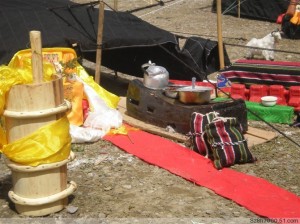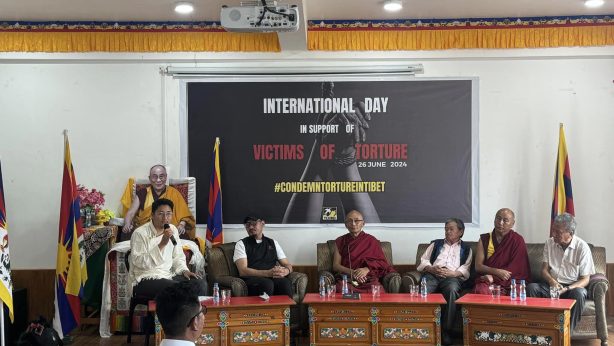Eight losses faced by Tibetan drogpas due to China’s resettlement policy

One of the most urgent issues affecting Tibetans inside Tibet today is the massive displacement induced by China’s development projects. Last month, Human Rights Watch reported that almost two million Tibetans, predominately nomads, have been displaced from their ancestral lands over the past seven years to make way for Chinese development in Tibet. Resettled in concrete houses in urban areas, displaced Tibetans suffer from innumerable problems such as the loss of their traditional economic livelihood and cultural dislocation.
The Chinese government argues that resettlement of Tibetan nomads is an economic necessity ostensibly to protect fragile Tibetan grasslands from what it calls “livestock overgrazing”. Behind such a rationale, however, is the implied accusation that nomads are unproductive people – economic liabilities – who stand in the way of China’s modernisation programs in Tibet.
TCHRD has translated and edited an essay by a Tibetan writer living inside Tibet who eloquently refutes Chinese assertions. The writer informs us that nomads are a proud, compassionate, honest, cultured and productive people who crafted their own independent source of living for centuries. The writer, born to nomadic parents, laments the losses nomads are currently suffering, including the loss of precious folk culture, because of their resettlement in urban areas.
He writes, “With the resettlement of drogpas in urban areas, they have given up the rich tradition of singing folk songs during festivals. All they do now is just eat and drink. Their children abhor folk stories too. They just idle away watching cartoons and other programs on state television. They are getting alienated from their rich drogpa folk culture.”
Written in a simple nomadic style the critical issues raised in the essay have struck a deep sympathetic chord with readers in Tibet. One of the readers said: “The issues raised in the essay are all related to the survival of nomads. We must seriously reflect on them.”
Echoing the same sentiments another wrote: “This noble author has spoken out the truth. I express my gratefulness to him. He is politically and economically very conscious. Everyone should read the essay and reflect on it.”
The article was carried on na shon sar pa (New Tibetan Youth), a popular website run from within Tibet. Click here for the original piece in Tibetan.
The author writes under the pseudonym bong tag ri lu (Bongtak Rilu)
Eight losses drogpas suffer because of resettlement in urban areas
by Bongtak Rilu
1. Loss of independent livelihood
Since ancient times, drogpas (nomads) have depended on livestock for their living. They have been used to eating dried meat, butter, cheese, milk, yoghurt and tsampa. These have become their staple diets. Moreover they survive on animal produces such as sheep wool, yak skin, cow dung and so on. They make tents, quilts and mattresses out of yak hide. Milk and yoghurt gave them a robust health. Yak and sheep dung fuel their hearths. With resettlement in urban areas, drogpas have been deprived of their traditional sources of living and staple diets. Now drogpas have to visit Chinese streets (gya sang) to buy milk, yoghurt, cheese and firewood. The prices of these foods, which drogpas are used to eating, have skyrocketed. They have to pay six to eight renminbi for one gyama* of milk and thirteen to fifteen renminbi for one gyama of meat. Drogpas have no choice but to wait – their throats dry and hands empty – for the compensation money the state provides them. Their previous independent source of living has now disappeared.
2. Loss of unity and solidarity
It is generally said that Tibetan people are kind and compassionate. Tibetan drogpas, in particular, have developed a harmonious relation with their surrounding environment, including the snow-mountains. Because of difficult travel and communication systems and other environmental hazards on the roof of the world, drogpas have had to settle in particular areas. In some places, only one or two families can be found. Cities with vast population have never existed. Drogpas are divided into different villages. When they migrate to greener pastures, treat animals infected with diseases and shear them for wool, drogpas seek the help of fellow drogpas from other villages. As a result, they get plenty of opportunities to mingle and cooperate with each other. Their experience of helping each other means drogpas have developed a culture of unity and solidarity among themselves. With the resettlement in urban areas, drogpas have been deprived of work requiring collective efforts. They now abhor helping each other. Because of atomised lives, drogpa culture of unity and solidarity is disappearing. Without any cooperative interaction among themselves, drogpas remain isolated in their [concrete houses] staring blankly at each other.
3. Loss of culture of decency and respect
Tibetans are known to be decent people. To elders we accord the respect generally due to our parents. Those who are younger than us we shower them with love and kindness as if they are our real siblings. More admirable than this is the kind of hospitality given to guests visiting our homes. Even beggars who possess nothing would be showered with clothes to wear and food to eat when they arrive in nomadic areas. When guests leave our homes, we have a beautiful culture of not walking in front or behind them. With the resettlement of dropgas in urban areas – in concrete houses – the culture of decency and respect among drogpas is disappearing. Drogpas now avoid visiting their neighbours. When they leave their houses, they put huge locks on their doors. They live their lives suspecting about anything that they see and touch. Their previous culture of hospitality, of inviting guests to their homes, has disappeared.
4. Loss of a unique livelihood
In the course of their long history, nations have developed their own unique source of livelihood. Tibetans are no exception. Drogpas have developed their own four-squared black tents to live in, three-headed hearths to light their homes, ropes to tie animals – thus crafting a livelihood autonomous and self-sufficient. Because of the creative genius of our ancestors, we have a unique dwelling called nomadic tent. These tents are constructed in such a way that they can absorb fresh air from outside, while getting rid of the damp air inside. The tents have the ability to keep dwellers within warm during winter and cool during summer. Yak dung can easily catch fire in the three-headed hearths, causing no serious problems to nomads and their animals. Moreover, the art of weaving clothes give drogpas a good physical exercise. Whether milking their animals or churning out butter and cheese, such activities give them a good source of living and strong physique. Drogpa livelihood is thus unique and productive. With the resettlement of drogpas in urban areas, this unique livelihood is now disappearing. Unlike their drogpa ancestors, the coming generation shall be deprived of [the joy] of erecting tents, building hearths, milking animals and churning out butter and cheese.
5. Loss of ancestral homelands
Since ancient times, drogpas and their ancestors have been dwelling on high mountains blessed with pure rivers. Our ancestors have been performing the ritual of burning incense (sang) on mountains, throwing blessed mani stones (deu bum) into rivers, putting up prayer flags on the hills and hanging cotton on trees in forests. All these rituals, conducted for thousands of years, are meant to protect rivers, forests and mountains from pollution. We believe that digging out the earth will invite the wrath of nyens (evil spirits), polluting waters that of lu (nagas) and destroying mountains would alienate ancestral gods dwelling in them. Such myths and beliefs have served to protect Tibet’s environment. Resettling the nomads haphazardly in urban areas by forcing them to sell their animals, all in the name of grassland protection, means they will be displaced from their ancestral homelands. This will not work. An example could be given of Australia, a nation that relies heavily on animal husbandry. Australian government tried to increase the population of livestock by hunting down foxes. This, however, had a devastating impact on the population of livestock. In the end, the government was forced to bring foxes from other countries and released them on the grasslands. Similarly, there has to have an interdependent existence between livestock and grasslands of Tibet. Simply dispensing with the animals cannot save Tibetan grasslands.
6. Loss of drogpa folk culture
Even before they attend schools, drogpa children receive plenty of folk wisdom from their parents. Drogpa children have a tradition of visiting their neighbors’ tents and spending nights therein. While herding animals on the mountains, they sing folk songs and narrate folk stories and sayings to each other. Children learn counting by playing with sheep droppings – they keep the droppings in their palms and ask their friends to count them. During festivals like the Tibetan New Year, drogpas sing songs and narrate satires. Drogpas thus have a rich folk culture. To give my own example: I never went to a university, but when I was a child my drogpa parents narrated me the epics of Gesar and other folk stories. Because of such experience, I have been able to gain some wisdom. With the resettlement of drogpas in urban areas, they have given up the rich tradition of singing folk songs during festivals. All they do now is just eat and drink. Their children abhor folk stories too. They just idle away watching cartoons and other programs on state television. They are getting alienated from their rich drogpa folk culture.
7. Loss of culture of shame and modesty
Tibetans are a people who value human traits such as shame and modesty. On surface such culture of shame and modesty might appear backward, but if observed closely one would realize that it demonstrates our deep faith in karma. Drogpas will never use objects of other people. They will use their own objects. They are not freeloaders. Drogpas are honest people. If they found out an object, they will make sure it is returned to the rightful owner. Their modesty surprises me. During seasonal migrations, even if they leave behind their precious belongings in their tents, no one will steal them. I have never heard of thieves and bandits among drogpas. With the resettlement in urban areas, drogpas are now facing livelihood crisis. Young men are jobless. To pass out their time, they visit Chinese streets and play snooker. Increasing number of them also resort to thieving and robbery during night.
8. Loss of drogpa humanity
“The character of drogpas is as pure-white as cotton; their soul as pure-white as cotton; their words as soft as cotton.” This is excerpted from the lyrics of a song I penned for a Tibetan musician. After I returned from my visit to a couple of Chinese cities, a strong realization dawned on me: that our homeland is pure and our people honest. During my association and interaction with many a different people in big cities, I missed my drogpa brothers and sisters, especially their honesty. Since ancient times, virtues such as not harming and manipulating people are inherent in drogpa souls. With the resettlement in urban areas, this profound drogpa humanity is gradually being eroded—thanks to their interaction with all sorts of vain people. This loss of drogpa humanity pains me to the bone. It robs my sleep.
*Gyama (Tib): Unit of measurement equivalent to 500 grams.


